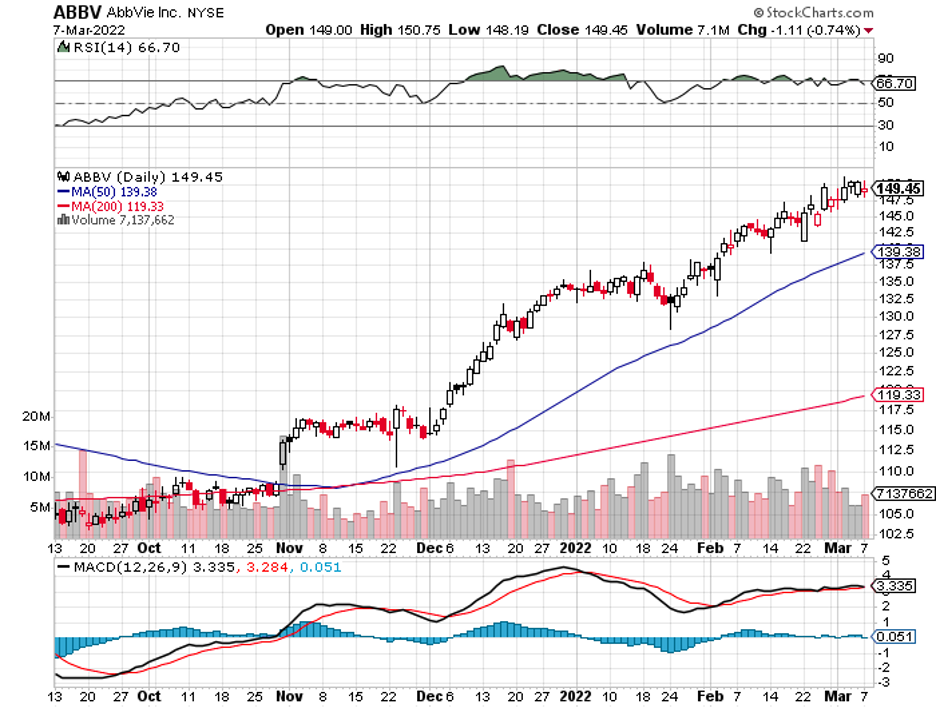A Biotechnology and Healthcare Trifecta Stock
A myriad of macroeconomic problems has thrown the stock market and the economy off balance.
Major US indices have been down since 2022, with some like the Nasdaq slipping by over 10% year-to-date due to volatile trading.
Meanwhile, there are businesses on a tear amid the issues.
One of them is AbbVie (ABBV), which gained more than 20% over the past six months.
This growth reinforced AbbVie’s reputation as a rock-solid investment that investors can rely on during uncertain periods.
Looking at its performance, AbbVie can be considered an investor’s trifecta primarily because of the benefits the company offers, namely, high yield, promising growth potential, and solid dividend growth.
AbbVie came off 2021 with 30% growth in its shares despite the global economic slowdown.
During that period, AbbVie reported a 13.4% year-over-year increase in its adjusted EPS at $3.31 and a 7.4% jump for its revenues at $14.9 billion.
This notable performance is mainly due to Humira’s sales, but this won’t be the case in the following years.
In 2018, AbbVie lost patent protection for Humira in Europe and is slated to lose exclusivity in the US by 2023.
For the longest time, AbbVie has depended mainly on Humira as its most vital source of revenue stream.
Nowadays, the company has been taking on a more diversified tactic instead of solely relying on the top-selling drug. The effects can be seen in its fourth-quarter report.
The company’s oncology sector grew by 4.6% to reach $1.9 billion. As for its neuroscience branch, it reported $1.7 billion in revenues or an impressive 19% climb from last year.
While AbbVie has been honing its diversification plans, the company still hasn’t forgotten where its true strength lies: immunology treatments.
Its immunology segment, where Humira is filed under, raked in $6.7 billion in revenues, showing a 13.2% increase compared to the same period.
To keep the momentum and preserve its spot as the leader in this segment, AbbVie introduced two successors to Humira: Skyrizi and Rinvoq.
In the same report, it can be seen that Humira still brought in the bulk of AbbVie’s immunology revenues at $5.33 billion, indicating a 3.5% increase in its previous revenues.
However, Skyrizi and Rinvoq also showed promising results.
Skyrizi sales carried on with its upward trajectory, as seen in the whopping 70.5% jump it recorded to contribute $895 million to the company.
As for Rinvoq, this treatment recorded an even higher jump at 84.4% to reach $517 million.
Throughout 2021, Skyrizi generated $2.94 billion while Rinvoq contributed $1.65 billion in sales. This indicated an 85% growth for Skyrizi and an over 100% year increase for Rinvoq.
Considering their performance, these two immunology successors to Humira are anticipated to move forward at a strong clip as AbbVie bags more FDA approvals for additional uses.
If things go as planned, Skyrizi and Rinvoq can quickly reach a combined revenue of $15 billion by 2025.
Outside its immunology sector, oncology treatment Imbruvica is projected to become another blockbuster.
To date, this drug ranks second to Humira in terms of sales, with roughly $5.41 billion in total in 2021.
Meanwhile, AbbVie has also been busy boosting its neurosciences division.
The company recently acquired Belgium-based Syndesi Therapeutics for approximately $1 billion.
Offering an upfront payment of $130 million, Syndesi granted AbbVie access to its portfolio of novel modulators of the synaptic vesicle protein 2A (SV2A). Among the products in development, the most prized treatment is Syndesi’s lead molecule SDI 118.
This mechanism is currently under Phase 1b trials for its potential use to treat cognitive impairment and other conditions linked to various neuropsychiatric and neurodegenerative diseases. These include Alzheimer’s disease and major depressive disorder.
Basically, SDI-118 targets a patient’s nerve terminals to boost synaptic efficiency.
This would complement the bigger company’s existing neuroscience efforts since AbbVie believes that synaptic dysfunction is an underlying problem when it comes to cognitive impairment associated with several disorders.
Launched in 2017, Syndesi is a biotechnology company backed by Novo Holdings, which owns controlling shares in global companies Novo Nordisk (NVO) and Novozymes (CPH).
Apart from its remarkable performance and growing pipeline, AbbVie’s stock dividend also serves as a strong pull for investors.
AbbVie stands at $1.41 per quarter or $5.64 per year.
Since its inception in 2013, the company has consistently increased its dividend annually.
In fact, AbbVie’s dividend yield of 3.87% remains a key attraction to investors despite the stock’s rising price.
No matter what metrics you use, AbbVie has managed to securely position itself at the top of the healthcare and biotechnology sector.
Over the course of the more than 9 years since AbbVie became a publicly-traded company, only Eli Lilly (LLY) has raked in higher total returns.
While the general market continues to bring uncertainty, AbbVie has been executing all the right moves to provide shareholders a haven to invest their hard-earned cash and earn a steady and rising return.

